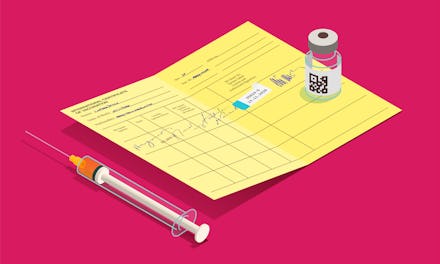How would a 'vaccine passport' work, exactly?

Well before COVID-19 vaccines existed, people were speculating about how life would change once they were created. There were — extremely reasonable — concerns that vaccines would not be distributed equitably, and there were also conspiracy theories about how all vaccinated people would someday have QR codes tattooed on them that would also allow tech companies and the government to track our every move. Now that the vaccines are rolling out globally, some countries are starting to issue “vaccine passports,” which feel like some kind of dystopian freedom pass. Here’s everything we know about what vaccine passports are, who they’re for, and what effect they may have on people’s daily lives.
The concept behind vaccine passports, it seems, is that they would allow people who have been fully vaccinated to return to “normal” life. They are still theoretical in most countries, but what could happen is that when you’re vaccinated, you get a card or a digital code that proves you’ve had the vaxx, The New York Times reported. A passport would allow some people to spend time with their families, engage freely in capitalism —a.k.a. go to the mall — and potentially even travel internationally.
Vaccine passports could become mandatory on airlines, and some tourist industries and proponents contend that this would allow the travel industry a much-need boost, reported the Times. The passport itself would likely be digital, akin to an app that you can pull up on your phone. The challenge there is creating a digital product that can be used anywhere in the world and that also protects your privacy.
But privacy isn’t the only concern here. Proposed passport systems are already creating protest movements in Britain and Denmark, where they are seen by some as tyrannical efforts to exclude those who have opted out of vaccination. Several countries in the E.U. are considering vaccine passports, and Biden has asked federal agencies to explore passport options for the U.S., the Times reported. Some infectious disease experts have stated that passports are inevitable, but that they should be implemented humanely.
The only country that has begun distributing vaccine passports is Israel, so that doesn’t give us many real world scenarios to study. In Israel, the vaccine passport — or green badge system, as it’s referred to — is being issued as either a paper document or a QR code that certifies the bearer has been vaccinated. People with the “green passport” are then allowed in “vaccinated-only” gyms, malls, and restaurants, the Times reported.
“Whoever does not get vaccinated will be left behind,” Israeli Health Minister Yuli Edelstein told the Times. It’s worth noting that Israel has consistently flexed its high vaccination rate while completely ignoring the fact that Palestinians have been completely left out of their public health efforts. Basically, Israel is already leading the world in vaccine nationalism and it seems like they’re trying to get ahead when it comes to vaxx-based discrimination, too.
So, yes, vaccine passports may let some people go back to a sense of normalcy, but they could also intensify divisions between the vaxxed and the not-vaxxed. In the U.S., there’s already a high degree of justified vaccine hesitancy amongst Black people, who are three times more likely to die from the disease than white people. So as we consider how vaccine passports may "work," it seems equally important to consider what we might be working against.